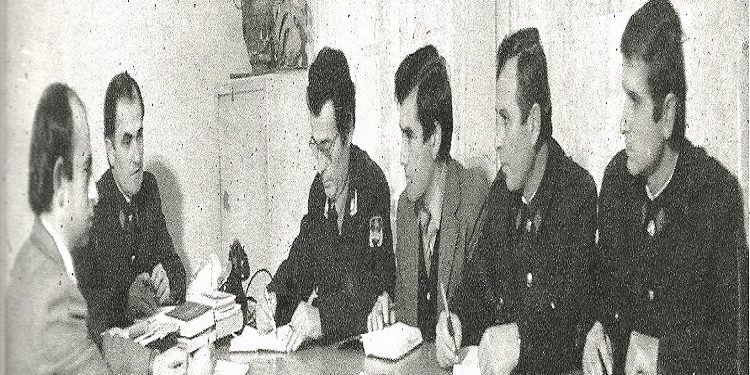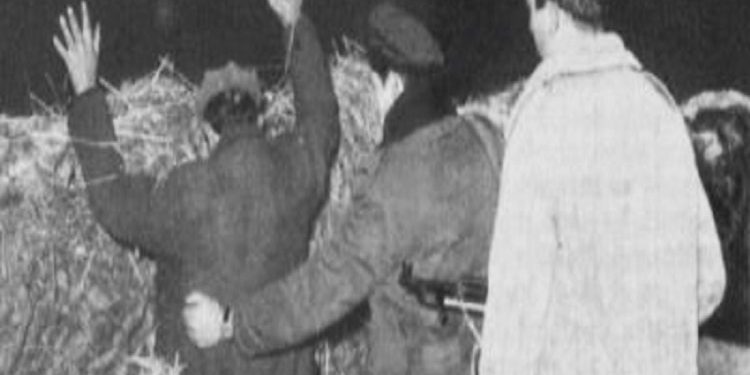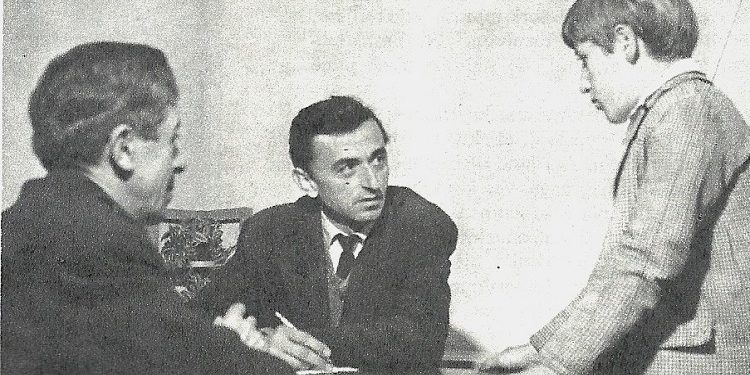By Nafi Çegrani
Part One
THE PHENOMENON OF YUGOSLAV ESPIONAGE
Memorie.al / Espionage, known since ancient times as the “invisible eye of power,” have always taken on a tragic and bloody hue in the Balkans. In this space where empires have collided like waves on rocks, secrecy and betrayal became everyday currency. For Albanians, this phenomenon was not just a technique for rulers to control the people, but a wound that became embedded in the collective psychology and historical consciousness. At its core, espionage is not simply the collection of information-it is a refined violence on the human mind, interference in the most intimate zones of freedom. It mixes fear with suspicion, causing a person to lose inner peace and society to be torn apart by mistrust. In this sense, espionage is the second act of slavery: the first is physical chains; the second is the imprisonment of consciousness.
In the Albanian political dimension, especially during the 20th century, classical espionage was used as a tool of totalitarian control. The secret services of the Ottoman Empire, then of the Kingdom of Serbs, Croats, and Slovenes, of communist Yugoslavia, and of the communist regime in Albania itself, nurtured a culture of blackmail and fear. Every free word could be turned into a testimony against oneself. Every friend could be turned into a spy. This created a sociological condition where solidarity dissolved and was replaced by silence and suspicion.
Psychologically, espionage deformed a person’s relationship with the truth. The Albanian was faced with a constant dilemma: to say what they think and risk it, or to be silent and save them, but lose their identity? This tension constitutes an existential drama that accompanied the Albanian person for decades, teaching them to divide themselves into two: the inner person who thought freely and the outer person who adapted with the mask of the time.
In general, espionage is the bitterest proof of what Foucault called a “surveillance society”: power no longer needs to be physically present at all time; the feeling that someone is watching you is enough. Thus, the Albanian in the Balkans often lived as if in an invisible cage, where the guards were their own frightened thoughts.
But, at the same time, this phenomenon also brought to light another force: moral resistance. Albanian history is filled with examples of those who did not sell out, who were not broken, and who did not accept turning their conscience into a commodity. They testified that, although espionage seeks to break the spirit, there are always individuals who choose to remain free, even in the face of the sacrifice of life.
I must emphasize that the legacy of this phenomenon is still visible today: in the internal mistrust among Albanian political groups, in unnecessary divisions, in the lack of a culture of stable cooperation. Like an unhealed wound, the espionage of yesterday still wanders in memory, reminding us that freedom is not a gift, but a permanent act of caring for truth and honesty.
It must be understood that espionage is not just the history of secret services. It is a mirror where we see our fears and weaknesses, but also the courage of those who endured the times. It is a reminder that, to be truly free, an Albanian must learn not only to defend the borders of the land but also to protect the borders of the soul from betrayal and manipulation.
…Espionage in the Balkans was never a cold game of intelligence. Here, it became fate, blood, a wound. In this space where history moved like a knife on the flesh of peoples, every power saw secrecy as a weapon and man as an object of manipulation.
After World War II, Albanians found themselves between two wild surveillance systems: in Yugoslavia and in Albania. OZNA-Tito’s infamous body-was the “revolutionary vigilance” that spared no one. It treated Albanians as a “foreign body” in the Yugoslav state and filled the prisons of Niš, Idrizovo, and Goli Otok with people who only sought an Albanian school, flag, and dignity.
After OZNA came the UDBA, which for decades built its network of fear: Albanian villages were turned into control territories where every neighborhood had its own “eye.” On the other side of the border, the State Security in Albania used the same mechanism. Under the slogan of protecting the people’s power, it recruited brothers against brothers, friends against friends.
Words spoken in the bedroom could turn into investigative reports. Families lived in permanent fear that one of them had become a “collaborator.” This is the deepest form of destruction of social trust.
KOS, the Yugoslav military service, used the border as a diversionary arena. Dozens of young Albanians were recruited and sent as “saboteurs” to Albania, often without full knowledge that they were becoming tools of a larger game. They ended up killed, disappeared, or used as a justification for new repressions. Thus, espionage was not only control but also the fabrication of enemies to fuel the machinery of terror.
The examples are endless. In Kosovo, in the 50s and 60s, hundreds of Albanians were sentenced as “Informbureauists” or “irredentists” on fabricated charges by the UDBA. In Albania, in the 70s and 80s, intellectuals, students, and peasants were imprisoned on charges of “Yugoslav” or “imperialist” agency. In fact, many of these cases were the product of secret games between the services.
From my point of view, this reality created a culture of internal fear: the Albanian began to doubt himself, his friend, his neighbor. Doubt became a collective state. Only silence seemed like salvation, but even that was often interpreted as a “hostile attitude.” So, there was no way out.
From a sociological and historical perspective, it is known that espionage as a concrete phenomenon has become an act of dividing Albanians. Instead of having a common national project, they often fell prey to staged suspicions and hostilities. The Albanian diaspora in the West was hit hard by this game: the UDBA infiltrated the ranks of migrants, while the Sigurimi sent its own agents. Many Albanian organizations were broken from within, losing the power to act.
But, in the midst of this darkness, there was always a light: people who refused to be part of this game. Those who were silent, but did not spy. Those who sacrificed themselves, but did not betray. They are the purest testimony that espionage, no matter how powerful it may seem, cannot completely destroy free consciousness.
It is very clear that espionage, since the years of the system with Bolshevik roots, and which were constructed with the totalitarian systems in the Balkans, remains a symbol of the person separated from the concepts of correct political and social humanitarian thought. It shows us how easily power can use fear as an instrument, but also how fragile and strong at the same time the human spirit is. Albanian history teaches us that, beyond visible violence, a secret battle exists: the battle to preserve trust and dignity in the face of the invisible eyes of power.
The Agent Networks during the Communist Era
After World War II, Albanians lived between two worlds of surveillance: in Yugoslavia and in Albania. OZNA, Tito’s infamous body, for many years monitored and eliminated every voice that could oppose power. In the Albanian villages of Kosovo and Macedonia, people were declared “enemies of the state” for political motives, often without real evidence.
After OZNA came the UDBA, which built extensive agent networks, infiltrating every neighborhood, institution, and political organization. Every word, every glance, every friend could be turned into a report that threatened a person’s life and liberty.
In Albania, the State Security followed the same strategy, using secret recruitments and moral blackmail to create its network of agents. Students, intellectuals, peasants, and even family members were forced to become part of this apparatus, often without full knowledge of the consequences of their actions. Fabricated judicial processes and concocted charges became a means to deform justice and fuel fear.
But the Balkans was not the only ground for classical espionage. In the Eastern Bloc, agent networks were similarly structured, but with greater capacities and an unprecedented degree of surveillance. The KGB in the Soviet Union, Stasi in East Germany, Służba Bezpieczeństwa in Poland, as well as other services in Hungary and Czechoslovakia, created sophisticated networks of agents, informers, and saboteurs.
They not only controlled the internal population but also influenced the Albanian emigration and diaspora, using manipulation and blackmail to destroy organizations that could oppose the regimes.
Psychologically, the agent networks created a constant climate of suspicion and fear. The Albanian, raised in a space where every friend could be a spy, began to divide himself into two: the inner person who thought freely and the outer person who adapted with the mask of the time. In this way, espionage did not only strike the body but also the soul and consciousness.
The division of society, the loss of trust between individuals, the deformation of family and community relationships, were a direct consequence of the agent networks. The Albanian diaspora, especially in the West, faced a secret war: the UDBA and other services infiltrated immigrant organizations, causing division, mistrust, and the defeat of common projects.
Nevertheless, amid this darkness, a moral resistance existed. Individuals who refused to be part of the game of power, who held faith in human and national values, showed that espionage, no matter how sophisticated, cannot completely destroy the freedom of the spirit. The history of Albania and the Eastern Bloc is filled with examples of those who were not broken, who did not betray, who remained free within a space filled with invisible eyes.
Agent networks are the symbol of the invisible eye that controls, deforms, and obstructs. But they are also proof of the power of human consciousness, of the possibility to preserve moral and spiritual freedom even in the face of a totalitarian mechanism that seems invincible. Every act of espionage, every secret report, is not only an instrument of power; it is a reflection of the tension between fear and dignity, between survival and morality, between silence and inner freedom.
The history of espionage and agent networks, whether in the Balkans or in the Eastern Bloc, is not just a document of violence on the body and mind. It is a mirror where we see the fears, weaknesses, and courage of man. It is a constant reminder that freedom is not a gift, but a battle to preserve dignity, values, and trust, even when every visible space to be free is taken away.
In this context, we can emphasize some key points:
- The structure of agent networks – the method of recruiting agents, the use of spies within the population and political organizations, the coordination centers, and the hierarchies within the secret services.
- Methods of control and manipulation – blackmail, threats, the use of secret informers, the fabrication of judicial processes, and the spread of fear as a political instrument.
- The psychological and sociological effect – the division of society, the loss of trust between individuals, the deformation of collective consciousness, the “culture of silence and suspicion.”
- The philosophical and literary dimension – agent networks as a metaphor for the “invisible eye” of power, the battle for the preservation of moral and spiritual freedom, the clash of the individual with the force of totalitarian surveillance structures.
- Historical examples – beyond Yugoslavia (OZNA, UDBA, KOS), services such as the KGB in the Soviet Union, Stasi in East Germany, as well as agent networks in Poland, Hungary, Czechoslovakia, etc., can be included, showing how these networks functioned and the impact they had on Albanians and Albanian communities in exile.
The Recruitment of Agents
The recruitment of agents is never just an administrative procedure; it is a sophisticated art of influencing the human mind and spirit. In the Balkans and beyond, secret services developed this art in different ways, but with the same goal: to turn the individual into a tool of power. In this sense, every recruited agent is, at the same time, a product of stripped freedom and deformed moral choice.
Volunteers were often young idealists, intellectuals, or individuals who sought knowledge, power, or protection. For Yugoslav services such as the UDBA and KOS, these individuals were not just informers: they were bridges to penetrate Albanian communities, the diaspora, and cultural and political institutions.
The recruitment method was a combination of psychological tactics and refined pressure: an invitation to collaborate often came as a career opportunity, as a chance to help the nation, or as a rescue from an immediate danger.
Double agents, on the other hand, are a further reflection of moral complexity. They live in the shadows, wearing two faces: one face that serves power and another that preserves their own conscience or interests.
In Albania of the totalitarian regime, where the State Security had established an extensive network of agents and informers, this phenomenon became a frightening tool: every friend could be an agent, every family member could inform.
Psychologically, this system created a constant tension between the desire for freedom and the fear of consequences. Individuals who refused to collaborate often faced isolation, imprisonment, or social death. Those who accepted, often to protect themselves or their family, became silent participants in a great mechanism of manipulation.
The methods used by the Yugoslav and communist intelligence services were varied:
- Personal and moral blackmail – information about private life, family ties, past mistakes, was used to coerce the individual.
- Ideological origin – recruitment was often presented as a service to ideology, to the nation, or to the “revolution.”
- Corruption and material benefits – a chance for a career, trips abroad, and economic privileges turned into a trap for those hungry to escape misery or isolation.
- The use of affection and personal relationships – manipulated friends, colleagues, even lovers to convince the individual to become part of the network.
All of this, in this context, can be understood as creating a society where trust was a luxury and suspicion was the norm. A community where every word could be turned against the individual was a fragmented community, where solidarity was replaced by fear and personal interests.
The recruitment of agents and informers presents the deepest moral dilemma: how far can a person go to protect themselves, their family, or ideology, and to what extent does this forced choice deform the soul? Albanian history of the communist era, but also the experience of the Balkans and the Eastern Bloc, shows that the individual often has to balance between two worlds: a visible world of security and a secret world of the soul that seeks freedom and honesty.
Nevertheless, agent networks and sophisticated recruitments are not just a history of secret services. They are stories about the nature of man, about the tension between fear and morality, between survival and consciousness, and about the permanent challenge of preserving inner freedom, even when the invisible eye of power seems to cover everything.
The Recruitment of Agents
…In this context, the recruitment of agents was not just a bureaucratic procedure; it was a sophisticated art of control over the human mind and spirit. In the Balkans and beyond, secret services developed this art using psychological tactics, moral blackmail, and ideological manipulation, with the aim of turning the individual into a tool of power.
In Yugoslavia, OZNA and then the UDBA built deep agent networks that penetrated every Albanian institution. Many students, intellectuals, teachers, and young immigrants were recruited as volunteer informers, often under the illusion that they were serving a national or ideological cause.
A documented example is that of some Albanian students from Kosovo in the 50s, who were invited by the UDBA for “collaboration,” promising them scholarships for studies in Belgrade. Many of them were forced to inform on the activities of fellow students, creating deep divisions among colleagues and friends.
In Albania, the State Security used similar methods, but with a special refinement. Individuals who did not have strongly consolidated ideological ties were often the prey of blackmail or economic pressure. A well-known case is that of some young intellectuals in Tirana in the 70s, who were initially recruited as “secret informers” to monitor the cultural and academic activities of their friends.
Some of them accepted to protect their families from persecution, while others refused and faced imprisonment or internment in distant cities.
Double agents became a symbol of the moral dilemma: they lived with two faces – one face for power, another for conscience. A well-known example is that of a group of young Albanians who were recruited by the UDBA in Pristina and then used by the Sigurimi to transmit reports on their collaborators. Those who worked with two services, often to protect themselves, faced double fear: the feeling of betrayal and the real danger from each service. /Memorie.al

















